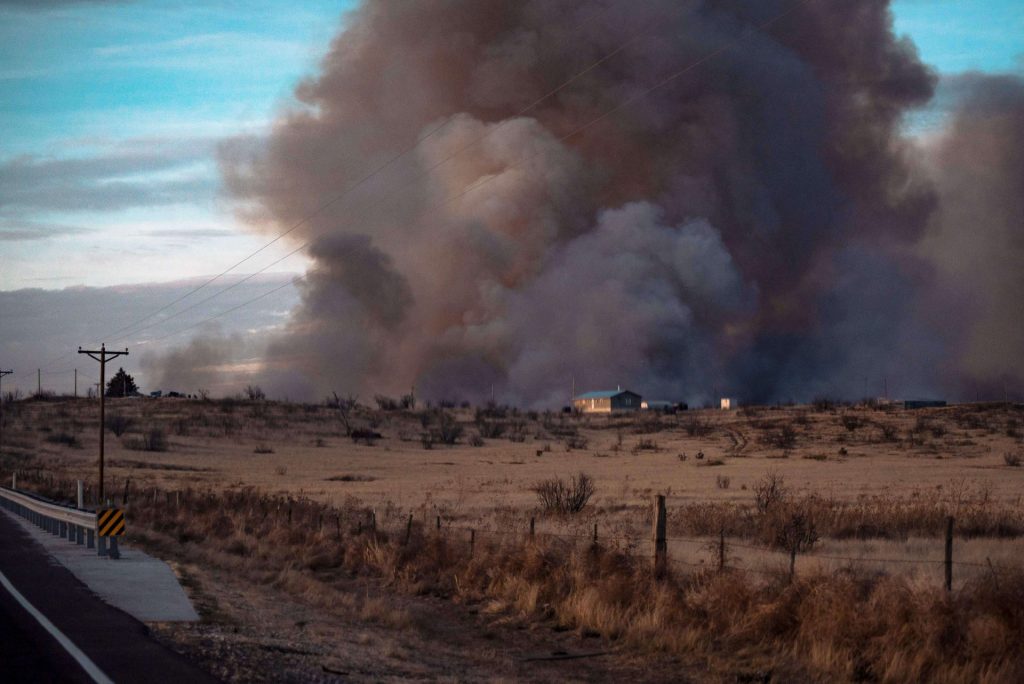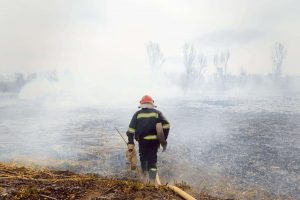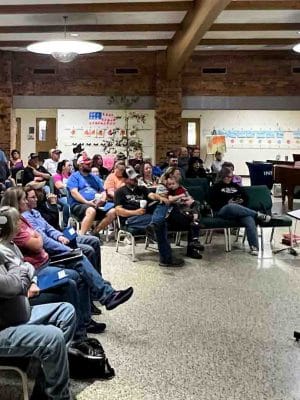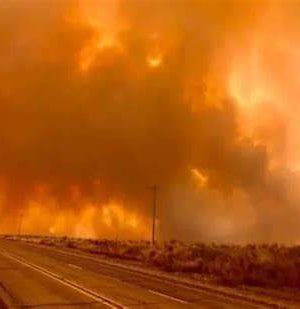The Smokehouse Creek Fire and Upcoming Litigation

The Smokehouse Creek Fire and Upcoming Litigation
In the wake of the Smokehouse Creek Fire, a tragedy that has deeply affected the Texas Panhandle, Mikal Watts and Watts Law Firm LLP have filed a crucial lawsuit on behalf of victims left in the disaster’s path. The fire, originating from a failed utility pole, quickly became one of the largest wildfires in Texas history, leaving behind a trail of destruction and loss. With a focus on justice and accountability, the firm has promptly begun the process of establishing liability, engaging fire experts to meticulously examine the scene.
The fire not only claimed homes, land and material possessions but also lives; individuals either trapped or caught in desperate attempts to escape. Others who survived now suffer with severe burns and smoke inhalation injuries, as well as devastating emotional trauma. Against this backdrop of profound loss, Watts Law Firm LLP’s legal action embodies a solemn commitment to facilitating the community’s healing process and acts as a deterrent against utility companies prioritizing profits over the safety and lives of individuals.
Background of the Smokehouse Creek Fire in the Texas Panhandle
The Smokehouse Creek Fire, ignited on February 26, 2024, near Stinnett, Texas, stands as a grim testament to the consequences of utility negligence in the Texas Panhandle. Initiated by the failure of an inadequately maintained wooden utility pole, the fallen power lines sparked an inferno that rapidly expanded, consuming the town of Canadian, Texas, and ultimately burning over 1.1 million acres, making it the largest wildfire in the state’s history.
Amidst this overwhelming destruction, the most harrowing toll was the loss of human lives, casting a long shadow of grief. Those fortunate enough to survive were thrust into a world of loss, their lives uprooted and the familiar landscape of their existence transformed into ashes. Farms were decimated, ranches obliterated, cattle and other animals needlessly killed, and countless families were stripped of their homes, livelihoods, and possessions steeped in memories.
In the aftermath, those affected have faced extensive damages to both personal and real property, with the impact stretching well beyond the court’s jurisdictional limits. The plaintiffs’ losses are vast, covering the destruction of personal property, costs for replacement or repairs, the loss of property use, and the intrinsic value of lost vegetation. The lawsuit seeks to obtain all actual or compensatory damages allowed by law for both past and anticipated future harms, underscoring the gross negligence of the defendants responsible for this tragedy.

Mikal Watts Has Proof of Liability by the Defendants
In the aftermath of the Smokehouse Creek Fire, the investigation by Mikal Watts and expert fire reconstructionists pointed to three principal defendants: XCEL Energy Services (XES), Southwestern Public Service Company (SPS), and Osmose Utility Services, Inc. (Osmose), each implicated due to their specific roles and responsibilities tied to the utility infrastructure implicated in starting the fire.
SPS, as the owner, operator, and maintainer of the overhead power poles and lines at the time of the fire, bore a critical duty. This responsibility was not only common law and non-delegable but also regulatory, demanding adherence to the National Electric Safety Code and industry standards. SPS was obligated to ensure the power infrastructure was constructed, installed, operated, maintained, and controlled safely, and that inspections, repairs, and maintenance were conducted to prevent such tragedies, especially under foreseeable wind conditions that could cause pole failures and subsequent fires.
XES, as the parent company of SPS, is implicated due to its association and oversight responsibilities, suggesting a breach in their duty to ensure their subsidiary’s adherence to safety and maintenance standards. The lawsuit alleges that negligence by SPS and XES in these areas was a proximate cause of the devastating wildfire and the extensive damages incurred by the plaintiffs.
Osmose, engaged by SPS and/or XES for the inspection of these power poles, assumed a duty to conduct its activities with reasonable care. It was tasked with the crucial job of inspecting the poles, power lines, and associated equipment in a proper and safe manner. Moreover, Osmose had the responsibility to report the findings of its inspections accurately. The failure to fulfill these duties, as alleged, contributed to the conditions that allowed the utility pole to fail, sparking the catastrophic fire.
The Strategy of Mass Tort Litigation for Utility Negligence
Mass tort litigation represents a strategic legal approach, especially relevant in scenarios where numerous individuals are harmed by the same cause, as witnessed in the Smokehouse Creek Fire. This form of litigation aggregates the claims of all victims against one or more defendants into a single pre-trial action, enhancing efficiency in addressing common issues of fact and law. Yet, it maintains the individuality of each case, ensuring the specific losses and damages experienced by each plaintiff are duly recognized and addressed.
One of the primary advantages of pursuing a mass tort claim for the Smokehouse Creek Fire victims lies in the shared burden of litigation costs. Litigation expenses, particularly those associated with hiring specialized experts like fire analysts, can be significant. These experts play a crucial role in establishing the cause of the fire, the extent of the damage, and the defendants’ negligence. In an individual lawsuit, the cost of engaging such experts could be overwhelming for a single plaintiff. However, within the framework of a mass tort, these expenses are distributed across all participants. As a result, each victim’s share of the cost is significantly reduced, making it financially feasible to access top-tier expert analyses and testimony.
As an example, if an expert’s fee throughout a litigation is $500,000, that would be a large cost to bear by a single plaintiff. However, a band of 500 plaintiffs in mass tort or multidistrict litigation will obtain the same benefit from the same expert, but it will only cost each plaintiff $1,000.
Beyond cost savings, if the Texas Multidistrict Litigation (MDL) panel accepts this case for consolidation, it will streamline the process further, allowing for a more efficient management of pretrial proceedings such as discovery and motions. This consolidation under the MDL can lead to quicker resolutions or settlements, benefitting all parties involved by reducing the time and resources required for each individual case to navigate through the legal system.
Thus, the strategy of mass tort litigation not only makes the pursuit of justice against large, well-resourced defendants like utility companies viable for individual victims but also maximizes the potential for a favorable outcome by pooling resources, expertise, and evidentiary efforts. This collective approach ensures that the costs of securing expert testimony, which is a critical component in proving the case, are manageable and proportional to the recovery, allowing victims to stand on equal footing with the defendants in their quest for accountability and compensation.
The Goals of Litigation in the Aftermath of Wildfire
In the aftermath of the Smokehouse Creek Fire, the primary mission of Watts Law Firm LLP is unequivocally to secure comprehensive compensation for the victims who have endured catastrophic losses. Leveraging their extensive experience in wildfire litigation, the firm employs innovative proprietary software designed to meticulously document every loss suffered by their clients. This tool is pivotal in guiding clients through a detailed inventory process, prompting them to recall and record items lost in each room of their homes, as well as the broader devastation to land and vegetation, including trees. The emphasis is on ensuring no detail is overlooked, acknowledging that the defendants bear full responsibility for the breadth of the destruction.
Beyond the immediate objective of compensation, the litigation carries a broader and more profound aim: to compel utility companies to prioritize safety over profit margins. Through their extensive experience in fire litigation, Watts Law Firm LLP has witnessed firsthand how these legal battles can lead to substantial shifts in how utility companies approach their infrastructure maintenance and safety protocols. In past cases handled by the firm, the pressure exerted through litigation has prompted utility companies to undertake significant measures, such as burying power lines—an expensive but highly effective precaution against the risk of wildfires. This step, which companies had deferred for as long as possible, underscores a pivotal shift towards viewing safety as an essential investment rather than a negotiable expense.
The litigation also aims to catalyze regulatory change and influence policy-making in the utility sector. By highlighting the dire consequences of negligence and the tangible benefits of proactive safety measures, these legal actions advocate for stronger oversight and more stringent safety standards. The ultimate goal is to embed a culture of prevention within the utility industry, where the safety of communities and the preservation of the environment are prioritized above all else.
Watts Law Firm LLP envisions a future where its fire litigation practice closes up shop, not because of a lack of dedication but because utility companies have fully integrated safety into their operational practices. By pushing for these changes, the firm aims to create a reality where wildfires caused by utility negligence become a relic of the past, ensuring the safety and well-being of communities across the nation. This mission, at its core, is about transforming the landscape of utility management and regulation, making the world a safer place for all.

Mikal Watts
Mikal C. Watts is Board-Certified in Personal Injury Trial Law by the Texas Board of Legal Specialization and is a Martindale-Hubbel AV Rated Lawyer.




